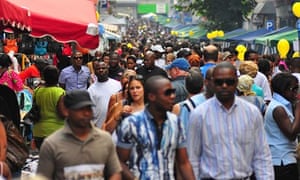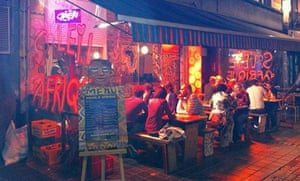Belgium's Divide
"You know, we hear a lot about how the Arabs are a fragile community that suffers, but we, 'les blackies', are discriminated against too, and we hurt nobody."
"If you don't like it here, go home. If you stay here, integrate. Try to get along. Join society. Respect this society's laws."
Nico Atoba, Belgian black African
"The Congolese have no interest in what the Arabs are doing. We want to go out. We want to drink. We want to live."
"We want to be left in peace."
Angele Casongo, Matonge, Brussels
 |
| Photo of Matonge, the African Brussels by 1W1V |
"We have to be honest. We Africans do more harm to ourselves than others do to us. But we didn't come here to make trouble, we came here to earn our bread and survive."
"Everyone suffers. What matters is how you solve your problems."
Belgian Congolese woman, government worker
"We were slaves before and we came here for better lives. The Belgians give us everything. There are hospitals. We have access to all the banks. We must thank them for this, not attack them."
"[The Arabs] say they are distressed, that they are unemployed. Too bad. They say the police harass them. I can assure you, the police harass blacks much more."
Christelle Isabu, Belgian Congolese
 |
| Street scene in Matonge, Brussels. Photograph: Cyril Plapied/Flickr |
Colonial countries all so often end up hosting people of the countries they had colonized. And so it was with Belgium, when it found itself, post-World-War Two, with a labour shortage, which impelled the government to invite people from its former colonies to come to Belgium to work. Congolese did that, and so did Moroccans. The Congolese appreciated the opportunity to advance themselves living in an technologically advanced, economically flush country, and adapted. The Moroccans felt themselves exploited and unappreciated, and tried to adapt Belgium to their own perceived needs.
That dissatisfaction with the countries of Europe that have absorbed Muslims from across the globe is tied into Islam itself. Congolese try to work themselves around the racism that still permeates the social atmosphere, and Moroccans and Algerians in Belgium, do what Muslims dispersed within the countries of Europe all seem to do; emboldened by their numbers they agitate for Sharia law to be imposed, claiming that laws brought down by god himself are superior to mere man-made laws.
The cultural crossroads of the European Union, roughly 70 percent of the capital's one million people have their roots outside Belgium. Of those who are not indigenous to Belgium, about 250,000 are mostly of Moroccan descent with an additional 50,000 or so being black Africans. Both the Arabs and the Africans have long lived in Belgium, but their lives there don't intersect. They are completely polarized. The Muslims live in Maelbeek and Mollenbeek, while the Congolese live in nearby Matonge, all suburbs of Brussels.
 |
| Le Soleil d'Afrique restaurant Photograph: Emma Beddington |
While the Arab quarters are sullen and resentful, the Congolese are colourful, rowdy and brimming with joie de vivre. Nightclubs and bars, shops and restaurants that sell and serve traditional African foods are located there, and African languages like Swahili and Lingala are spoken in lively conversations. If Congolese Belgians talk politics it isn't the politics of jihad. French West Africa is also well represented, and so are problems like gang turf-wars for the drug trade.
And there is no love lost between the blacks and the Arabs in Belgium. Christelle Isabu's husband is from Senegal, a Muslim. The mosque he attended confused him "because there were big, bizarre conversations taking place there that disturbed him. The Imam described to him a religion that was different than what his father had told him about back home." And so, for his own comfort requiring a separation from the message delivered there, he sought out a different mosque.
"You can be as you want, to be here", said Maxime Logon. "But for the Arabs, they must follow one line. Everyone must practise Islam or else."
0 Comments:
Post a Comment
<< Home